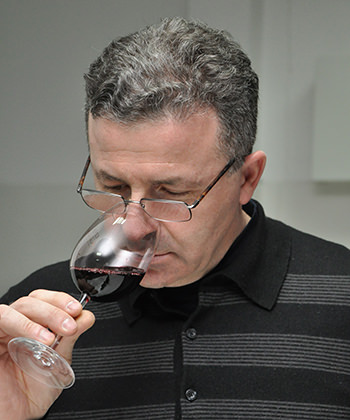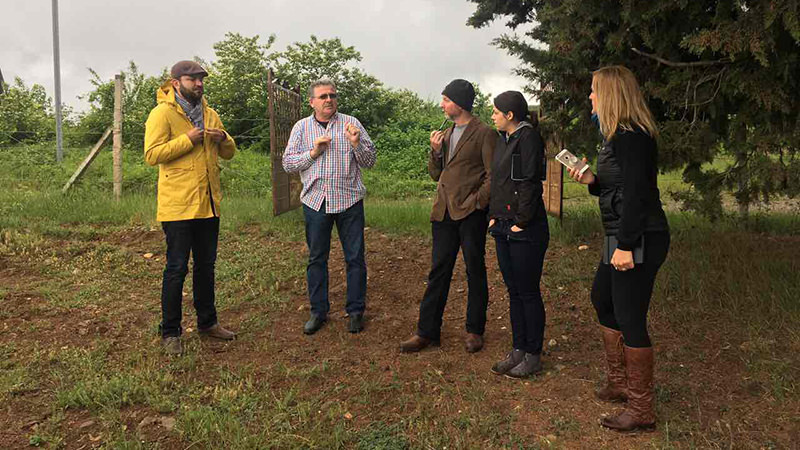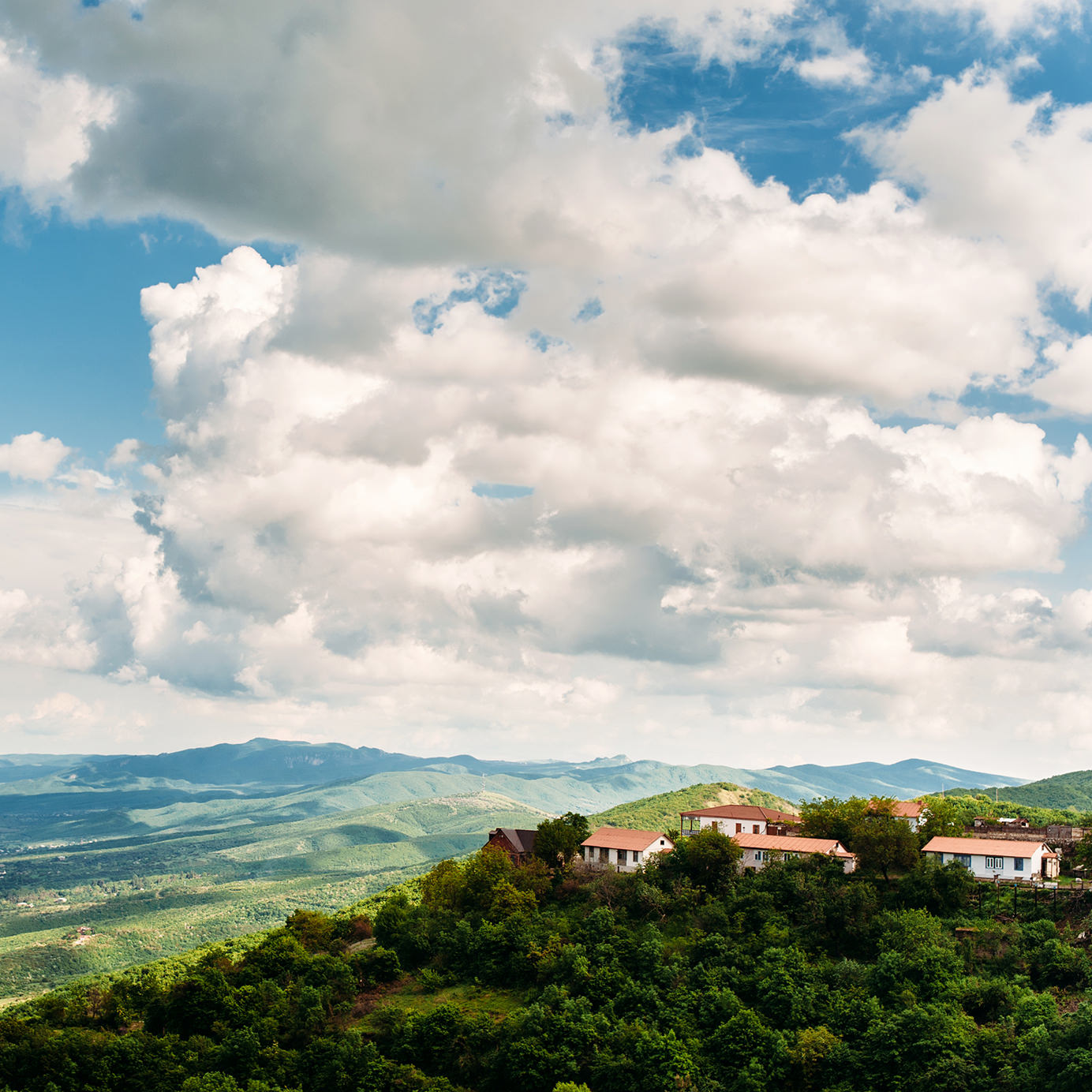“Georgia and the vine are very similar in their character,” Lado Uzunashvili says, “If they are not stressed a little bit, they don’t give you their best results.”
Uzunashvili owns the Mukado winery in Georgia and represents the 11th generation in a long line of esteemed Georgian winemakers. It’s an impressive heritage, matching the oldest winemaking lineages of France and Italy. If anybody is qualified to explain the importance of wine in Georgian culture and history, it’s Uzunashvili.
“Wine is the means of social life, the means of merrymaking, the means of getting together as families, friends, relatives, and guests,” he says. “To respect your guests you must offer your wine. To make friends with a Georgian, go and drink a bottle of wine with him, then he will open his heart to you.”

For centuries, winemaking has been the engine of the Georgian economy. Russia has been its largest trading partner and export market — though arguably its most famous historical export is Soviet leader Josef Stalin, who was born in the Georgian city of Gori in 1878.
On May 26, 2018, Georgians marked 100 years since the Act of Independence, which established the Democratic Republic of Georgia in the aftermath of the Russian Revolution. In the 100 years since independence, the two nations have existed in near constant conflict; starting with the Russian Red Army invasion of Tbilisi, in March 1921, and continuing past the nation’s secession from the Soviet Union in April 1991.
To this day, relations remain complicated. And the story of Georgian identity is, in many ways, best understood through its wine.
*
In November 2017, Georgia garnered international attention when archaeologists uncovered winemaking evidence from 6000 BCE in two of the country’s most ancient villages. The discovery pushed back the known origins of winemaking by roughly 500 years, shining the spotlight on a country whose aged vines entwine every aspect of its national identity — from religious and cultural traditions, to politics, history, and even language.
Central to the Georgian winemaking tradition are qvevri: large, egg-shaped earthenware vessels used to ferment and store wine.
Vinification with qvevri differs from modern winemaking. One of the most significant distinctions occurs in the production of white wine, in which crushed grapes are left in contact with fermenting juice for an extended period. The egg-shaped vessels are sealed and then buried underground for the duration of fermentation and aging — an ancient form of temperature control that facilitates the extended period of skin contact without the wine spoiling.
Qvevri whites are typified by nuanced flavors, challenging and unusual tannic structure, as well as an interesting orange hue; they are, in essence, the OG when it comes to funky, skin-contact natural wines. Yet, while they are the undisputed symbol of Georgian winemaking, nowadays, qvevri wines account for just 1 percent of the nation’s annual output.
One thing that hasn’t changed over time is the use of native grape varieties, like Saperavi, Rkatsiteli, and Mtsvane, as well as 520 or so others. In the thousands of years that Georgia’s native vines have existed, they have evolved and adapted to their environment and climate.
Just as its vines have adapted, the nation’s culture has evolved with wine. So much so, in fact, that many believe that the Georgian Mkhedruli alphabet — which first appeared over a thousand years ago, and is still used to this day — was inspired by the tangling form of vines. Though no concrete evidence exists to confirm this claim, after reviewing the Mkhedruli written form of “Georgian Wine” (ქართული ღვინო) the theory, at the very least, seems plausible.
Another foundation of Georgian social culture is Supra. A traditional feast where repeated toasting is led by a tamada (appointed toastmaker), Uzunashvili describes it as a quintessentially Georgian form of therapy.
“Everybody toasts, everybody sings, and everybody says some verses — but only kind words are spoken,” he says. Given the turbulent events of modern Georgian history, it’s understandable why this form of group “therapy” might be so important to Georgian society.
*
When Soviet soldiers arrived in Georgia’s capital Tbilisi in 1921, Georgian family estates were broken up into communist-style collective farms. Winemaking families like the Uzunashvilis lost not only their profession, but with it their identity.
Then came the outbreak of the Second World War. Able-bodied males were drafted to fight for the Soviet Union, a nation with which the majority of Georgians did not identify. Among them were Uzunashvili’s uncle, grandfather, and great uncle Vado. Only Vado returned.
Uzunashvili left his homeland in 1981 to study winemaking in Moscow. “Sciences in the Soviet Union were very strong at that time,” he says. “I was already initiated to the traditional winemaking techniques of my country — this I had in my blood. So I wanted to learn industrial and modern winemaking.”

In 1985, while Uzunashvili was still studying in Moscow, Communist Party leader Mikhail Gorbachev introduced drastic reforms to the sale and production of alcohol in the Soviet Union.
Faced with a lowering birth rate, increased mortality, and worrying levels of alcoholism, Gorbachev ordered the uprooting of vast areas of vineyards throughout the nation and significantly tightened laws governing the sale of alcohol. During this era, Georgia lost an estimated 75 percent of its total vineyard area.
Uzunashvili remained in Moscow until the beginning of the fall of the Soviet Union in 1989. When he returned to Georgia, he discovered his homeland in economic turmoil.
With no professional prospects, and a desire to increase his winemaking knowledge, Uzunashvili cast his sights abroad. Within two years, he was living and working in Australia as a professional winemaker and had even started his own consultancy business, boasting a portfolio of international clients. He has since worked on projects in France, Morocco, Ukraine, Italy, and even Japan, and continues to give lectures at conferences around the world, speaking proficiently in English and French.
*
Like all facets of national and cultural identity, wine has a tendency to intertwine with politics — and vice versa. In March 2006, Russian officials announced an immediate ban on all Georgian wine imports. Around 80 to 90 percent of all wine that left the country at this time was destined for Russia.
The Russian Consumer Agency claimed that heavy metals and pesticides had been detected in 21 different types of imported Georgian wine on sale in the country, yet many feel the ban was politically motivated.
The 2006 embargo marked the beginning of an ongoing effort to inform the wider world about Georgian wine. The PR push, alongside a concerted effort by Georgian winemakers to improve winemaking practices, is finally beginning to bear fruit.
The World Bank rates Georgia as the leading former Soviet country in “ease of doing business” rankings, and 2016 saw a record number of Georgian wine exports to the U.K. Exports to the U.S. rose by a staggering 43 percent.
With improving infrastructure and a steadily increasing awareness of Georgian wines worldwide, the nation is well placed to take further strides in the coming years. Though it won’t all be smooth sailing from here.
Individual struggles aside, Georgia faces the same major challenges confronting the rest of the winemaking world, none of which is greater than climate change.
After extreme weather conditions hit winemaking regions around the world in 2017, global production fell to its lowest level in over 50 years. Particularly devastating were the spring frosts and intense summer heat waves that struck France, Italy, and Spain. Other natural disasters, such as the wildfires in Northern California, had less of an influence on output, though their economic impact was nonetheless profound.
In Georgia, the effects of climate change are beginning to present themselves in the form of a drier, hotter climate with decreased rainfall — conditions to which its native vines are not adapted. Luckily for Georgians, however, there might just be a very serendipitous solution to this global environmental crisis.
Shortly after his arrival in Australia in 1992, Lado Uzunashvili made an unusual discovery. “When I arrived in [Australia in] the early ’90s, my Australian friends told me ‘You know, we have some Georgian varieties here?’” he recalls.
Uzunashvili was startled. Native Georgian varieties are rarely grown outside the Caucasus region, yet here they were, halfway around the world. Australia, he soon learned, was the last stop in a remarkable journey for the vines, which were first taken from Georgia by a French ampelographer in the 1870s, before finally arriving— via Crimea, France, and California — in 1954.
The discovery inspired Uzunashvili as a possible solution to the growing issue of climate change in his country.
“I thought to myself, ‘These varieties have been growing in Australia in dry climate conditions for the last 60 years, why don’t I take them back to Georgia?’” Uzunashvili says. “They have already undergone natural selection, are well-adapted to hot and dry conditions, and they are producing absolutely stunning quality wines.”
Uzunashvili has since returned to Georgia and planted the hot-weather clones, though it will be a few years before they start producing high-quality grapes from which wine can be made.
“One thing that makes me really happy,” Uzunashvili finishes, excitedly, “Soviet hands have never touched them.”
To many Georgians, May 26 — and the fact that it will this year mark 100 years of independence — actually bears no significance whatsoever. In terms of existing as a nation and a culture, Georgia’s history stretches back much further than a century, especially when it comes to winemaking.
And wine is so much more than fermented grape juice. Just ask Lado Uzunashvili.
